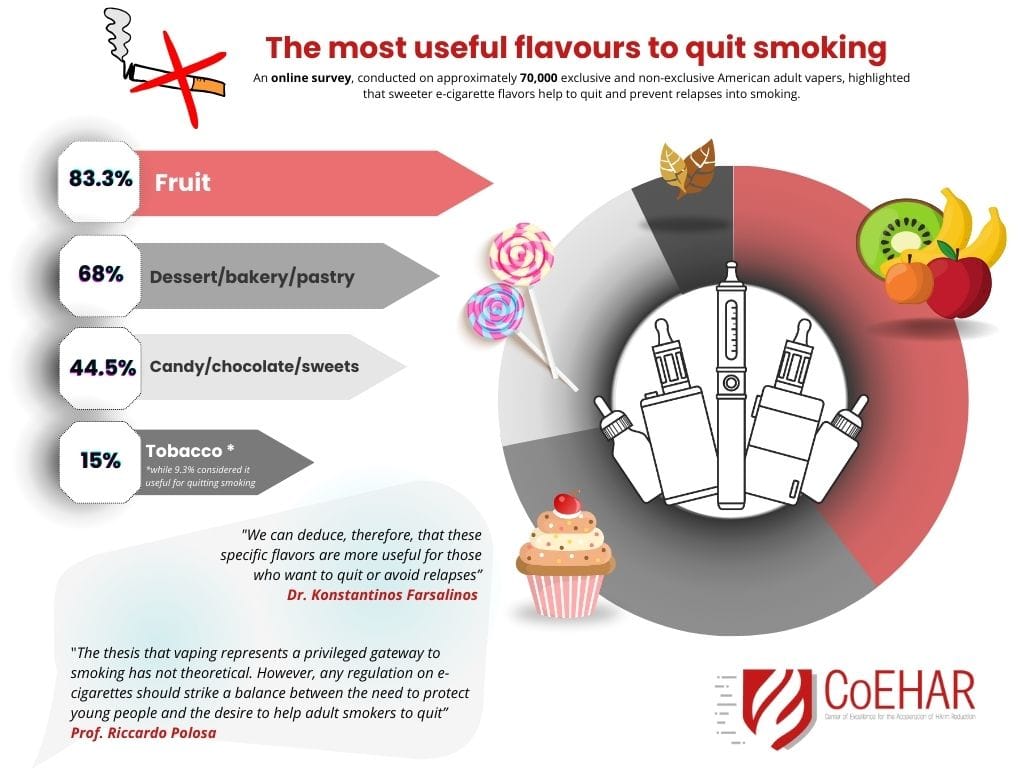An online survey, conducted on approximately 70,000 exclusive and non-exclusive American adult vapers, highlighted that the most utilized flavors to quit smoking are those of fruit, baked goods, and chocolate. These flavors are considered helpful in preventing and reducing the risk of relapses, but concerns about youth addiction are pushing government to enact strict state regulations
CATANIA, 18 October 2023 – The question of which flavors can help smokers quit represents a central issue in the scientific and political debate on nicotine-releasing electronic devices. In many cases, widespread commercialization is hindered by the fear that these devices may serve as an incentive for young people to try e-cigarettes and, consequently, initiate them to traditional smoking. To date, the availability of flavors on the market, which were over 7,700 according to a 2014 analysis, raises questions about the behavioral patterns of smokers approaching electronic cigarettes.
An assessment that could provide additional decision-making tools for policymakers, especially to avoid excessive concern directed at specific population groups, which could reduce the chances of success for those struggling to quit smoking.
A team of European researchers affiliated with CoEHAR, the University of West Attica, and the University of Patras in Greece conducted an online survey on a sample of about 70,000 adult vapers in the United States. The study focused on comparing flavor use between current-smoking vapers (dual use) and former-smoking vapers, and on specifically examining patterns of flavor use among former-smoking vapers at the time of quitting smoking.
The most popular flavors at e-cigarette use initiation were fruit (82.8%), followed by dessert/pastry/bakery (68.6%) and candy/chocolate/sweet (52.2%). Slightly higher prevalence of using fruit and dessert/pastry/bakery flavors was observed in those who never smoked compared to those who were currently and formerly smoking. Tobacco flavors were identified by 20.8% of participants and were by far the least common among participants who had never smoked.
The most widespread flavor for those at the time of quitting traditional cigarettes was once again fruit (83.3%), followed by dessert/bakery/pastry (68.0%), and candy/chocolate/sweets (44.5%). These flavors were also considered the most helpful for quitting smoking. The use of tobacco flavor was reported by only 15.0%, while 9.3% considered it useful for quitting smoking.
“This is the largest survey ever conducted on the use of electronic cigarettes in terms of sample size” explains Dr. Konstantinos Farsalinos, author of the study. “The most interesting data is that when a smoker decides to quit smoking using modified-risk electronic tools, they gravitate toward flavors different from tobacco, with a clear preference for fruit, dessert, and chocolate flavors. We can deduce, therefore, that these specific flavors are more useful for those who want to quit or avoid relapses”.
To date, limited data on the issue of flavors choice by smokers when turning to electronic cigarettes as a cessation tool. This study suggests that non-tobacco flavors are the preferred choice among those who want to quit.
Regarding the possible correlation between relapse rates and different types of flavors, this survey highlights that the vast majority of participants considered fruit and dessert/pastry/bakery and candy/chocolate/sweet flavors as important to avoid relapses.
“Identifying the factors that can promote the transition to tar-free products and accelerate eradication of smoking among adults is of utmost significance. One such factor is the inclusion of various flavors. Within this context, fruit as well as dessert/pastry/bakery and candy/chocolate/sweet flavors emerge as key elements that can aid adult smokers in their cessation efforts and contribute to reducing relapse rates.
Although further prospective studies are essential, this research presents compelling evidence that public health policies should refrain from adopting overly restrictive measures concerning flavours in electronic cigarettes” explains Prof. Riccardo Polosa, founder of the CoEHAR.
Considering the potential harm reduction of nicotine-releasing electronic devices, restrictive regulation could discourage smokers from switching to such products and slow down the fight against tobacco smoking.




